Treva B. Lindsey: The Future and the Now
Dr. Treva B. Lindsey is very much the future – of black popular cultural studies, feminist scholarship, social media activism, and so much more. Someone who is pushing conversations about feminism, and black popular culture, who is utilizing social media and public spaces to expand conversations, and someone who prioritizes community, engagement, and collective love, Dr. Lindsey is paving roads to a new future. An assistant professor in Women and Gender Studies at THE Ohio State University, Dr. Lindsey’s work focuses on black feminist thought, women’s historiography, and black popular cultural. Her work has appeared in The Journal of Pan-African Studies, SOULS, African and Black Diaspora, the Journal of African American Studies, and African American Review. She has also contributed to the Feminist Wire and appeared on Left of Black. Dr. Lindsey’s work is inspiring for its forward thinking, its extension of a larger history of black feminist thought, and its refusal to accept the status quo. More than her work, her online presence, and her commitment to social transformation, Treva embodies how the personal is political. Her ability to connect to her work, to shine a spotlight on its relevance, and incorporate theorizing and scholarship into her daily praxis is something to admire. Brilliant and kind, a teacher and social media game changer, an intellectual and a sports fan, Dr. Treva B. Lindsey is an inspiration. For these reasons and many more she is a scholar, an activist, a commentator, a teacher, and a feminist we love here at TFW (To watch more of Treva Lindsey’s brilliance, see her discussion with David Leonard here)
***
DJL: I am very excited to read your forthcoming book. Tell the readers about this book and how it fits within your larger work?
TBL: My first book project, Colored No More: New Negro Womanhood in the Nation’s Capital (forthcoming University of Illinois Press) explores New Negro womanhood in the nation’s capital during the early twentieth century. My book explores how African American women in Washington negotiated African American gender ideology during the New Negro era while simultaneously negotiating Jim Crow racism, economic and political disenfranchisement, and heteropatriarchy. Jim and Jane Crow, as multidimensional systems of oppression are central to my book and provide a point of departure for discussing how African American women in Washington crafted New Negro communities, practices, and organizations and institutions which addressed the specific needs and desires of African American women. Furthermore, my book introduces “Colored” and “New Negro” as monikers rooted in particular ideas about race, gender, class, and sexuality. Through exploring this particular community of women, I present how African American women confronted both intra- and interracial oppression during the early twentieth century.

Although Colored No More is at the center of my current research, my published and forthcoming articles and book chapters illuminate a broader and more multi-pronged interest in black gender studies. From pieces on skin bleaching practices of African American women in the late nineteenth and early twentieth centuries to a sex-positive analysis of how African American women use their bodies in music videos, my published and forthcoming research uncover historical and contemporary efforts of black women attempting to claim autonomy, to resist multiple forms of oppression, and to use expressivity as a vehicle for self-determination. The women and the representations of women I study exist in sites often identified as masculinist, exploitative, and anti-feminist. The women in my research invest in beauty culture, hip hop, and other forms of media and popular culture which often propagate dehumanizing and derogatory images of women and girls. These women occupy, challenge, resist, and disrupt racial, gender, and sexual conventions, norms, ideologies, and expectations. The women of Colored No More provide my research with a rich, historical grounding; these women are foundational to my arguments about the existence of black feminist political, expressive, and cultural traditions. My completed, in-progress, and future research seek to unearth a dynamic and multifaceted African American women-centered expressive culture as well as a heterogeneous and historically-grounded cultural ethos.
Much of my newer work revolves around contemporary popular culture; however, a historical lens remains instrumental in my forthcoming and future projects. Black Gender Studies is a burgeoning field, which encompasses Black Women’s Studies, Black Masculinity Studies, as well as Black Genderqueer Studies. I locate my scholarship within this evolving field because of my unwavering commitment to uncovering the particular effects of interlocking oppression on black women/womyn. I look forward to continuing using archival research, textual analysis and close reading, feminist theory, and black feminist cultural criticism to explore the contours of black women’s lives.
DJL: What role does digital technologies play in challenging patriarchy and misogyny within hip-hop?
TBL: Patriarchy and misogyny are glaring realities in almost every facet of our societies. Whereas digital technologies offer possibility for creating progressive, dynamic, and valuable challenges to oppressive systems, they also provide concretized space for systems of oppression to replicate and accrue pernicious and debilitating traction. I enjoy seeing how folks use and engage digital technologies to CREATE spaces for thoughtful intervention. Through social media conversations such as #HipHopEd or #HipHopIsForLovers to gatherings such as the Allied Media Conference, I firmly believe in the power of people embracing digital technologies as vehicles through which to envision a world in which all bodies and lives equally and justly matter. 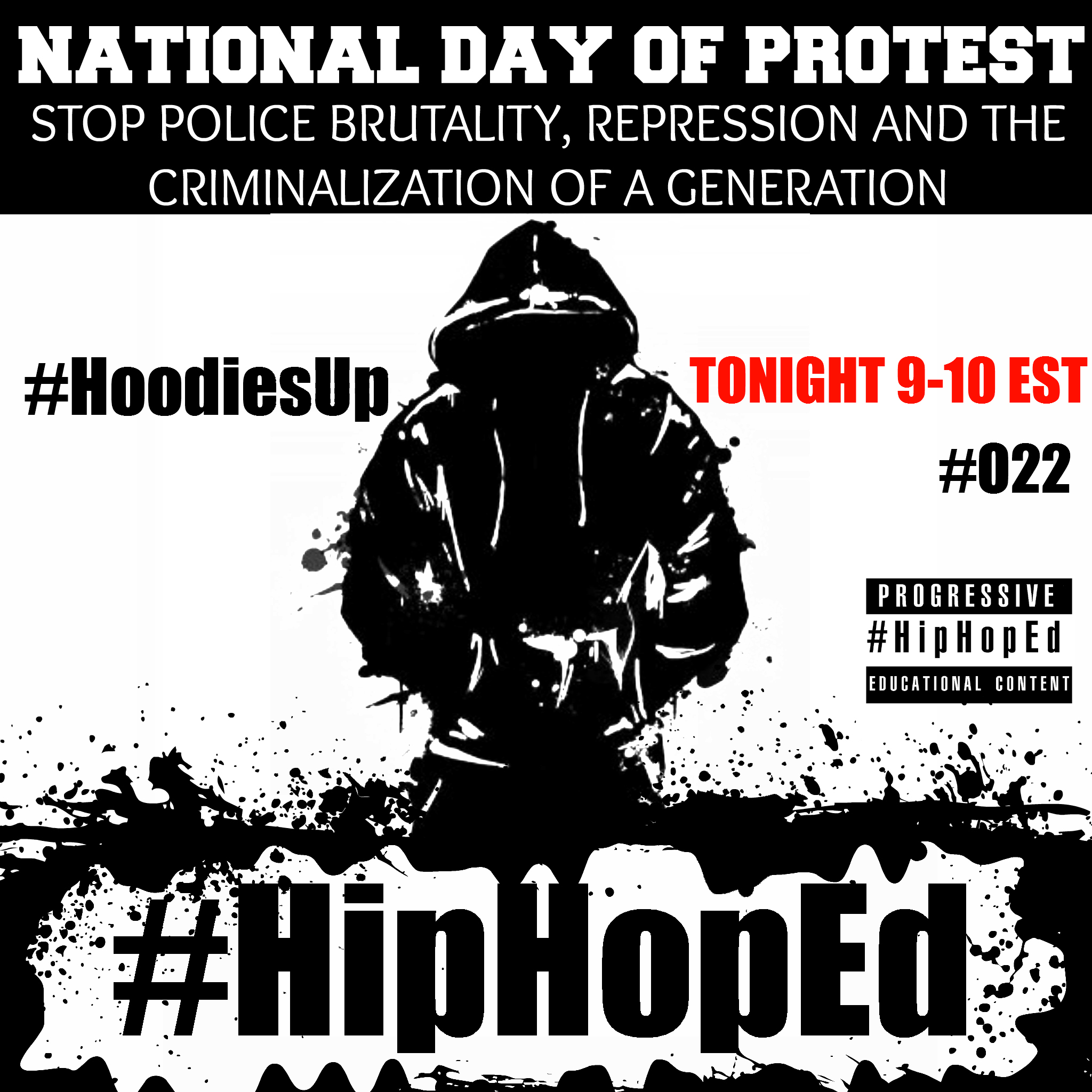 In specific regards to hip hop, I think digital technologies can offer a space of accountability for those explicitly and implicitly invested in perpetuating misogyny and patriarchy. We are listening and we are watching. We can respond with a sense of a purpose and capture the exigency of addressing specific and broader issues of gender and sexual oppression.
In specific regards to hip hop, I think digital technologies can offer a space of accountability for those explicitly and implicitly invested in perpetuating misogyny and patriarchy. We are listening and we are watching. We can respond with a sense of a purpose and capture the exigency of addressing specific and broader issues of gender and sexual oppression.
DJL: You write about Black sexuality and pleasure politics, how does you conceive this as a site of liberation and transformation?
TBL: My fellow pleasure ninja and amazing feminist scholar/co-founder of the Crunk Feminist Collective affirms that “there is no justice without pleasure.” I often work from the place of understanding that Black joy is a political project. When I think about liberation and transformation, I cannot envision these processes occurring without seriously accounting for the fullness of human experience. Undeniably, pleasure, joy, love, ecstasy, passion, and other affirming affective states play an integral role in feeling fully human. Just as we have the right to anger, ambivalence, disillusionment, and sadness, we also have the right to entice in those feelings that give arouse our sensory, emotional, and soul and spirit-centered selves. To sustain the work that we do, we must have access to laughter, smiles, and joyous expressivity. This formulation harkens back to both Gina Dent and Cornel West’s description of joy and pleasure in the groundbreaking collection Black Popular Culture: A Reader and also builds upon the work of dynamic women such as bell hooks, Audre Lorde, and Angela Davis.
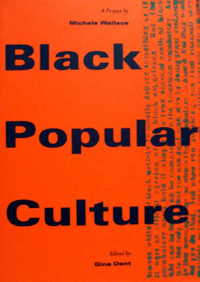
The legacy of this work, the work of excavating pleasure, joy, erotics, etc. as liberatory sites lives and breathes through the work of an amazing cadre of scholars today (The Pleasure Ninjas, the Black Sexual Economies Working Group, Queerness in Slavery Working Group). I am excited to see how this field expands and to witness how pleasure politics, particularly around sexuality. As Black gender and sexuality studies continue to grow as fields of inquiry, I expect the scholarship, artistry, and activism of those invested in pleasure politics to thrive at the forefront of liberatory movements.
DJL: Do we have a language to talk about black female sexual pleasure outside of hegemonic norms and male heterosexual pleasure; what are the challenges to creating this language?
TBL: The challenges, at times, appear insurmountable. The pervasiveness of heteropatriarchy and debilitating norms that continue to both police and malign black women’s bodies coupled with the market’s investment in the simultaneous commodification and devaluation of black female bodies make the work of claiming, naming, and owning pleasure particularly fraught. Nevertheless, I remain undaunted. The lack of current language indicates an opportunity to create language that more carefully and thoughtfully articulates the political significance of black women defining their own sexual schemas, subjectivities, and standpoints. These will be difficult conversations, but the work of scholars from around the African diaspora and the turn towards pleasure by many of us invested in Black gender and sexuality studies offer me tremendous hope that discussions about black female sexual pleasure can center black women. This work will continue to happen in conjunction with efforts to dismantle systems of oppression (racism, sexism, heterosexism, transphobia, misogyny, ableism, poverty, colonialism, and imperialism) that perpetuate damaging norms and systemic and institutional violations against black women.
DJL: Lets talk Scandal for a minute because of the various debates that have taken place as it relates to its politics, the question of black feminism, and community. Why has there been so much debate and contention about Scandal, and what do you make of the contestation over the show.
TBL: I enjoy Scandal. I think it’s important to start there. We often do not take seriously the visceral and emotional responses black women have. I enjoy the community of folks I engage with via social media during the show. I enjoy watching a fiercely styled, flawed, complicated, beautiful, and smart woman as a lead on a prime-time drama. The contestation around the show seemingly pivots around diverse perspectives about what constitutes a “desirable” representation of black womanhood. Many folks fixate, both positively and negatively on Scandal because very few shows feature black women as leads or substantive supporting characters. While some argue and continue to argue that Olivia Pope is a negative depiction of black womanhood or that she can be located within the framework of what Patricia Hill Collins identified as “controlling images,” I view the character as solidly complex and well-executed within the amoral universe in which ALL of Scandal’s characters operate. I do not particularly identify with Pope, but I do value that she has many contours and many fly coats. The overarching political tone of the show does not align with my political standpoint, however, it illuminates a particular political landscape for which we (black feminists and other politically progressive folks) can and should thoughtfully critique and engage. The popularity of Scandal also places it under a powerful microscope. Scandal offers quite a bit to grapple with and I delight in the conversations it prompts among black feminists. These conversations only further highlight the differing but equally important points of entry extant among those of use invested in racial, sexual, gender, and class justice.
DJL: How do you think the dialogue around Scandal is informed by/informs debates surrounding Beyoncé and Michelle Obama?
TBL: Discussions around Beyoncé and Michelle Obama appear to incite similar conversations and debates among black feminists. It is important to note the even under the banner of black feminism, we hold divergent perspectives and come to these conversations with a diverse body of concerns. These conversations shed light upon the complexity and plurality of black feminist/womanist/gender-progressive thought and praxis. My hope is that excavating these fissures, tensions, and differences enrich our theories and our practices- there is room at the table for multiple perspectives on these figures and on television shows. At the core, I believe we all care about justice and want a world in which justice fully encompasses black women. 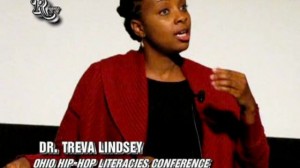
DJL: What role do you think popular culture should play in discussions of race and gender? Is there a danger in losing connections to the everyday struggles and violence? How do you mediate those concerns?
TBL: Popular culture provides a ripe site in which to engage discussions of race, gender, class, ability, religion/spirituality, ethnicity, and sexuality. I use it often in my classrooms. I think popular culture often enlivens our pedagogy and provides a unique space for critical exploration. Without question, when not examined thoughtfully and carefully, one can lose sight of how representation matters in the lived realities of people such as black women. Drawing connections between the representational and the material and the lived is central to how I teach and write about popular culture. “Good” black cultural studies is inextricably connected to a justice imperative. Particularly for those of us teaching popular culture, we must remain vigilant about the important role representation plays in our individual and collective daily lives. When students understand this connection, I think we encourage them to make the important connections to everyday violence and violations.
DJL: There has been a lot a debate about twitter feminism, and how race, gender, and technology are impacting contemporary feminist discourses. How can we create communities based on accountability and empowerment, that recognizes intersectionality and varied levels of privilege?
TBL: Have we achieved this IRL either? I ask this because I do not think we fully recognize intersectionality or levels of privilege in our non-technology based interactions. Contemporary feminist discourses occurring in spaces such as Twitter often mirror or at least build upon offline and historical discourses. Creating communities of accountability and empowerment require individual and collective efforts to wrestle with privilege, kyriarchy, and power. The level of reflexivity required for this kind of necessitates an emotional divestment from the idea that sustainable coalitions and community-building can thrive without addressing axes of domination and marginalization.
What role does technology play in twenty-first century feminism?
TBL: It plays an integral role for so many of use — though I think we should be careful about how we conceptualize technology. Technology, in a broad sense, tends to encapsulate tools such as computer, smartphones, media players- but what of people using “waste,” or their bodies to be a voice in the world? I think we might benefit from thinking about the role creativity plays in twenty-first century feminism. Technology, in the most traditional sense serves as one site of creativity for twenty-first century feminists. When we think about creativity by any and all means necessary as the primary vehicle through twenty-first century feminism will thrive, we open ourselves up to new and radical possibilities for liberatory movements and justice-based activism.
DJL: Are you seeing a resurgence of Black Feminism within not only academia but outside of academia? Where do you locate this resurgence?
I believe so. I engage with a number of young folks excited about feminism and particularly, Black feminism. I still encounter hesitation, reluctance, and frustration with the Black feminist moniker from folks across generations, and yet, I feel an increasing number of folks investing in gender-progressive, anti-capitalist, anti-patriarchal, anti-racist, and anti-heterosexist and transphobic work. Although it is wonderful to hear folks self-identifying as feminists or Black feminists, I remain more interested in the work people do. Unfortunately, I think increased interest in the work stems from harsh realities confronting so many of us and our communities. From incensing levels of violence against black women and trans women to high levels of poverty, the lived experiences of black women and girls compel many folks to involve themselves in organizations, efforts, and movements to eradicate systems of oppression.
DJL: What role has hip-hop played in your sense of Black feminist discourse and praxis?
TBL: I came to Black feminism through Joan Morgan’s work. 
I literally picked up her amazing book and found a way to articulate many things for which I previously had no words. When she coined “hip hop feminist,” I found possibility in both loving hip hop and identifying within gender justice-based struggles. Working in and on hip hop made and continues to make me a better feminist. The deep connection I have to hip hop allows me to critique and engage it from a place of love and of desire for it to connect to a radical vision of justice. Hip hop sharpened my analytical tools and provided me with a space to articulate a feminist standpoint that thoughtfully exists in a space of tension and complexity.
DJL: Are you optimistic about the directions in feminist discourse?
Overall, YES.
DJL: Who are some feminist you love and why?
TBL: Must I do a roll call?
DJL: Please!
TBL: Instead of a roll call, let me say that I love feminists who are bold, audacious, loving, critical, self-reflexive, creative, thoughtful, intersectional, anti-racist, anti-heterosexist, anti-imperialist, anti-colonialist, anti-transphobic, anti-ableist, anti-classist, and anti-misogynistic. I love feminists who support one another and who believe that their purpose is fighting for justice. I love feminists who believe unequivocally in freedom. I love feminists because I found myself within feminism.

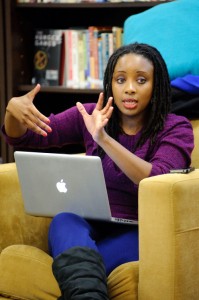

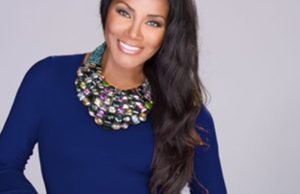

Pingback: Treva B. Lindsey: The Future and the Now, a Feminist we Love - The Feminist Wire | The Feminist Wire